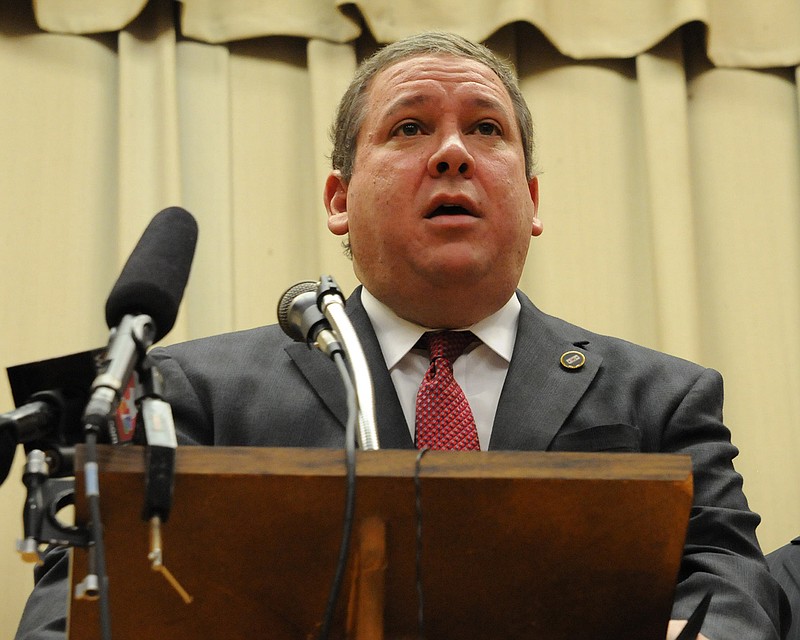Less government is not always good government.
State House Majority Leader Gerald McCormick of Chattanooga is thoughtful enough and brave enough to acknowledge that: He said last week that he made a mistake in 2012 by sponsoring a bill that abolished most legislative oversight panels, including the General Assembly's Corrections Oversight Committee.
Now, in the aftermath of two Tennessee prisons being placed on lockdown because of violence amid a severe shortage of correctional officers, McCormick, a Republican, sees the need to restore some of that oversight responsibility, including corrections oversight.
Read more
* Gov. Haslam says safety is first priority at state prisons* Given current prison flap, McCormick says abolishing corrections oversight panel was 'mistake'
Minus that 30-year, seasoned oversight, the Department of Correction recently switched correctional officers from a traditional 40-hour work week to a 28-day schedule to save $1.4 million in overtime costs.
"I think we do need to reinstitute some of the oversight committees, including corrections," McCormick told reporters last week. "It was a mistake for me to carry that bill in the first place. Should never have done it. The Legislature has an oversight responsibility and [has] to have the oversight committee in place and meeting on a regular basis rather than waiting until something goes wrong and then reacting to a situation and holding hearings."
More than 320 officers have quit since last August as the new prison scheduling changes rolled out. Remaining officers, whose starting wage is $27,070, sometimes had to work double shifts or travel across state to fill vacancies temporarily.
Meanwhile, the department expanded executive positions at higher salaries at its central office under the leadership of Commissioner Derrick Schofield, who started in 2011, according to the Associated Press. The new positions included a chief of staff making $125,352 a year and two additional deputy commissioners making $129,900 a year. The department also has four communications officers - spokespersons - and at least one of them is making more than $86,000. Five years ago, there was only spokesperson making considerably less.
The department has said the increase in executive positions is necessary and reflects "best practices" in the industry. The question, of course, is "best practices" for whom?
Northeast Correctional Complex in Mountain City was put on lockdown after a July 19 incident that injured an officer. Then on July 24, eight prisoners were injured in stabbings at Tiptonville's Northwest Correctional Complex, a result of tensions among rival gang members.
House Speaker Beth Harwell, R-Nashville, and Senate Speaker Ron Ramsey, R-Blountville, have announced hearings in their respective chambers' State and Local Government Committees. The speakers didn't respond to Times Free Press reporter Andy Sher's questions about reinstating the Corrections Oversight Committee. In 2012, Ramsey trumpeted the abolishing of various oversight panels as saving the state taxpayers more than $700,000.
Schofield and other members of Republican Gov. Bill Haslam's administration deny that requiring the guards to work a 28-day shift before they are eligible for overtime is the root cause of departures, and they say prisons are not understaffed. The department traditionally has had high staff turnover rates, they say, and with an improving economy, workers are leaving for better paying private-sector jobs.
Right. "Best practices."
Real best practices would not include throwing over a 30-year system that grew out of the inmate riots of 1985 when Tennessee prisons were set ablaze amid an overcrowding crisis that already had landed the state in federal court.
Real best practices would not trade that now-seasoned Corrections Oversight Committee (one that dug the state out of a mess, hired its own prison consultant and held regular meetings for years - keeping a close eye on statistics involving staff-to-inmate ratios, pay, inmate violence, assaults on staff and other indicators of problems), for piggy-backed standing committees which normally don't meet outside the part-time Legislature's regular session.
Real best practices would be understanding that the $1.4 million in overtime savings likely will be swamped by legal costs the state will surely incur as a result of litigation by the injured officer and eight stabbed inmates.
Finally, real best practices is exactly what the poor working prison officers did for themselves when they left to find steady pay, saner hours and employers who value order-maintaining guards over paper-pushers and public relations spin.
